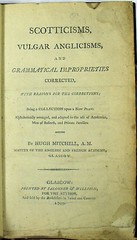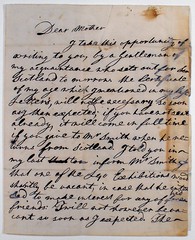Scotticisms and standardisation

Following the union of Scottish and English government in 1707 issues of language came to the forefront of political debate. Influential thinkers and politicians debated the merits of standardising the language across Britain, eradicating local variations. It became fashionable for ambitious middle-class Scots to stop using obviously identifiable Scots words and phrases. Self-help guides such as Hugh Mitchell’s Scotticisms, vulgar anglicisms, and grammatical improprieties corrected, with reasons for the corrections, published in Glasgow in 1799, were important tools in helping aspiring Scots disguise their linguistic heritage.

Many celebrated figures of the Scottish Enlightenment made efforts to speak and write in this formal, modified way. Often proud Scottish patriots, they believed that mastery of correct English would help improve the nation's standing by demonstrating to the world that Scots could represent the Union on the international stage as well as Englishmen. The famous economist Adam Smith (1723-1790) writes to his mother in such a style, in a letter from his student days. (Smith studied at the University of Glasgow, becoming a Snell Exhibitioner to the University of Oxford in 1740. He later returned to teach at Glasgow.)



